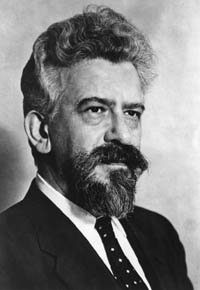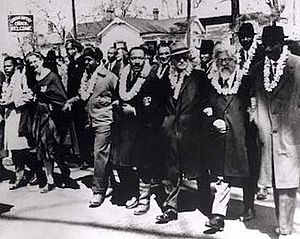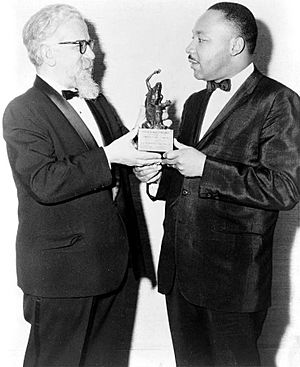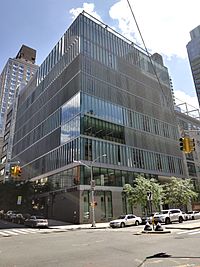Abraham Joshua Heschel facts for kids
Quick facts for kids Abraham Joshua Heschel |
|
|---|---|

Heschel in 1964
|
|
| Religion | Judaism |
| Denomination | Orthodox, Conservative |
| Alma mater |
|
| Personal | |
| Born | January 11, 1907 Warsaw, Poland |
| Died | December 23, 1972 (aged 65) New York City, New York, U.S. |
| Spouse |
Sylvia Straus
(m. 1946) |
| Children | Susannah |
| Religious career | |
| Profession | Theologian, philosopher |
Abraham Joshua Heschel (January 11, 1907 – December 23, 1972) was an important rabbi and thinker from Poland who later became an American citizen. He was one of the leading Jewish religious thinkers and philosophers of the 20th century. Heschel taught about Jewish mysticism at the Jewish Theological Seminary of America. He wrote many popular books on Jewish philosophy and was a key leader in the civil rights movement.
Contents
Biography
Abraham Joshua Heschel was born in Warsaw, Poland, in 1907. He was the youngest of six children. His family had many famous rabbis on both his mother's and father's sides. His father died when Abraham was nine years old. He received a traditional Jewish education and studied to become an Orthodox rabbi.
Later, Heschel went to the University of Berlin in Germany to earn his doctorate degree. He also studied to become a rabbi at the non-religious Hochschule für die Wissenschaft des Judentums. He learned from some of the best Jewish teachers of that time. In 1933, he published a book of Yiddish poems.
In October 1938, Heschel was arrested by the Gestapo, the secret police of Nazi Germany. He was forced to leave Germany and go back to Poland. He taught about Jewish philosophy in Warsaw for ten months. Just six weeks before Germany invaded Poland, Heschel left Warsaw for London. He was helped by Julian Morgenstern, who worked to get visas for Jewish scholars.
Heschel's sister Esther was killed in a German bombing. His mother was murdered by the Nazis. Two other sisters, Gittel and Devorah, died in Nazi concentration camps. He never went back to Germany, Austria, or Poland. He once wrote that every stone and tree there would remind him of the terrible things that happened.
Heschel arrived in New York City in March 1940. He taught at Hebrew Union College in Cincinnati for five years. In 1946, he moved to the Jewish Theological Seminary of America in New York City. He taught there until he passed away in 1972.
Heschel married Sylvia Straus, a concert pianist, in 1946. Their daughter, Susannah Heschel, also became a well-known Jewish scholar.
What He Believed

Heschel explored many parts of Jewish thought. He studied medieval Jewish philosophy, Kabbalah (Jewish mysticism), and Hasidic philosophy. He was very interested in spirituality and how people connect with God.
Heschel believed that the teachings of the Hebrew prophets were a strong call for people to take action for good in society. Because of this belief, he worked hard for African Americans' civil rights. He also spoke out against the Vietnam War.
He also thought that focusing only on religious rules was not enough. He believed that the spiritual and emotional parts of faith were just as important.
Influence Outside Judaism

Heschel was a widely read Jewish thinker. His most famous books include Man Is Not Alone, God in Search of Man, The Sabbath, and The Prophets. He represented American Jews at the Second Vatican Council. There, he convinced the Catholic Church to remove or change parts of their prayers that were disrespectful to Jews.
Heschel believed that religious experience is a basic human need, not just something for Jewish people. He thought that no single religion had all the answers about God. For these reasons, Martin Luther King Jr. called Heschel "a truly great prophet." Heschel was very active in the Civil Rights movement. He marched in the third Selma to Montgomery march with Dr. King and John Lewis.
Published Works
- The Earth Is the Lord's: The Inner World of the Jew in Eastern Europe. 1949. ISBN: 1-879045-42-7
- Man Is Not Alone: A Philosophy of Religion. 1951. ISBN: 0-374-51328-7
- The Sabbath: Its Meaning for Modern Man. 1951. ISBN: 1-59030-082-3
- Man's Quest for God: Studies in Prayer and Symbolism. 1954. ISBN: 0-684-16829-4
- God in Search of Man: A Philosophy of Judaism. 1955. ISBN: 0-374-51331-7
- The Prophets. 1962. ISBN: 0-06-093699-1
- Who Is Man? 1965. ISBN: 0-8047-0266-7
- Israel: An Echo of Eternity. 1969. ISBN: 1-879045-70-2
- A Passion for Truth. 1973. ISBN: 1-879045-41-9
- I asked for Wonder: A spiritual anthology. 1983. ISBN: 0-824505-42-5
- Heavenly Torah: As Refracted Through the Generations. 2005. ISBN: 0-8264-0802-8
- The Ineffable Name of God: Man: Poems. 2004. ISBN: 0-8264-1632-2
Man Is Not Alone (1951)
In this book, Heschel shares his ideas on how people can understand God. He explains that Judaism sees God as very different from humans. He explores how Jewish teachings help people connect with the amazing presence of the Divine. A main idea is the feeling of wonder and awe people have when they experience God.
The Sabbath (1951)
The Sabbath is about the meaning and celebration of Shabbat, the Jewish day of rest. Heschel believed that Judaism is a religion of time, not just space. He wrote that the Sabbath helps us make time holy. He warned that while we try to control space with technology, we might forget the importance of time itself.
God in Search of Man (1955)
This book is a follow-up to Man Is Not Alone. Heschel talks about how religious thoughts become faith. He explains how faith then leads to actions in a believer. He discusses how people can look for God's presence and the amazing feeling they get in return. He also explores the idea that God is looking for humanity.
The Prophets (1962)
This book studies the books of the Hebrew prophets. It looks at their lives and the times they lived in. Heschel explains that the prophets' view of God is not that God looks like a human. Instead, God has human feelings like anger or sorrow.
Heschel says that Hebrew prophets are special because they experience "Divine Pathos". This means God turns towards humanity and feels sorrow or anger when people turn away. Prophets remind people of God's voice, especially for those who are poor or treated unfairly.
Torah min HaShamayim (1962)
Many people consider this work to be Heschel's most important. It studies the ideas of ancient Jewish teachers (rabbis) found in the Talmud and Midrash. It explores their views on the nature of Torah (God's teachings), how God revealed himself to humans, and prophecy. It also looks at how Jews have used scripture to understand these core texts.
Who is Man? (1965)
In these lectures, Heschel explores what it means to be human. He asks, "What makes a human being truly human?" He suggests that our modern world might have misunderstood what it means to be human. He believes that not knowing who we truly are can lead us to pretend to be something we're not. Or, it can stop us from accepting what is at the very core of our being.
Awards and Commemoration
In 1970, Heschel won the National Jewish Book Award for his book Israel: An Echo of Eternity.

Five schools have been named after Heschel. These schools are in Buenos Aires, Argentina; New York City; Northridge, California; Agoura Hills, California; and Toronto, Canada. In 2009, a highway in Missouri was named "Dr. Abraham Joshua Heschel Highway." This happened after a Neo-Nazi group adopted that part of the highway. Heschel's daughter, Susannah, has said she does not approve of her father's name being used in this way.
Heschel's writings and papers are kept at Duke University's library.
In 2022, a new center for Catholic-Jewish relations was opened in Poland. It was named the Abraham J. Heschel Center. Important Catholic and Jewish leaders, including Rabbi Abraham Skorka and Susannah Heschel, attended the opening.
See also
 In Spanish: Abraham Joshua Heschel para niños
In Spanish: Abraham Joshua Heschel para niños
- List of peace activists
|
 | Ernest Everett Just |
 | Mary Jackson |
 | Emmett Chappelle |
 | Marie Maynard Daly |

